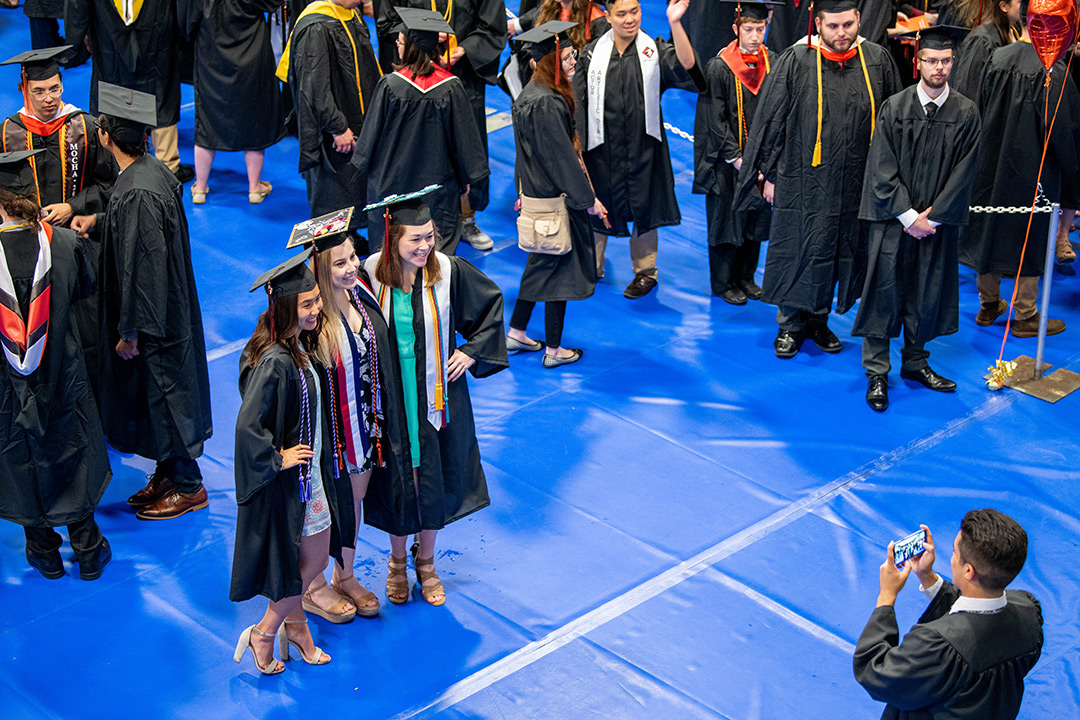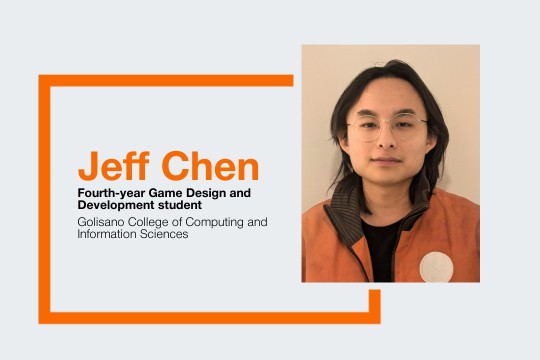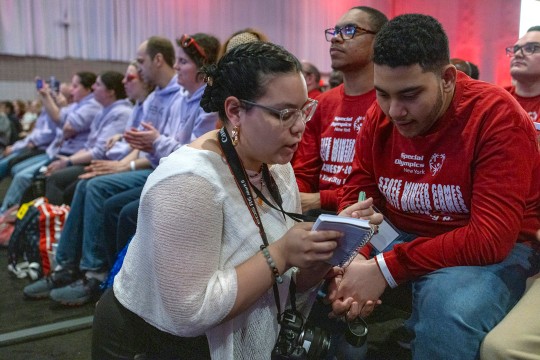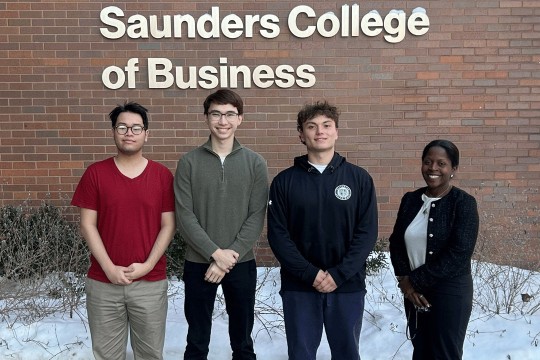RIT’s record 4,200 graduates challenged to ‘enrich the world’
RIT also congratulates a record 41 Ph.Ds. and inaugural grads from RIT China
Gabrielle Plucknette-DeVito
From left, graduates Shannon Lamasko, a mechanical engineering major from Anchorage, Alaska; Kasey Harmon, a chemical engineering major from Vineland, N.J.; and Gabi Cole, a mechanical engineering major from Norwood, N.Y., pose for a photo before the start of Academic Convocation.
More than 4,200 students graduated today at Rochester Institute of Technology, an all-time high. The graduates include 41 Ph.D. students – also a record high – and graduates at international RIT campuses in Croatia, Kosovo, Dubai, and for the first time, Weihai, China.
Keynote speaker John Seely Brown, former chief scientist of Xerox Corp. and director of the Xerox Palo Alto Research Center (PARC), told graduates they are entering “The Imagination Age, an age that calls for new ways to see, to imagine, to think, to act, to learn and one that also calls for us to re-examine the foundations of our way of being human, and what it means to be human.”
RIT President David Munson said the imagination shown on the RIT campus is a result of RIT leveraging its strengths in technology, the arts and design to produce graduates in every discipline capable of practicing transformative innovation that serves the greater good.
“Today’s world needs people who know how to create and innovate, analyze and implement, collaborate and lead,” Munson said. “Creativity begins with people, and at RIT, we have an unusual assembly of exceptional minds.”
Munson said RIT intends to capitalize on the distinctiveness of RIT to further cement its role in higher education.
“We represent creativity and innovation in all fields, with a strong culture of making,” he said. “We make things that never existed before, whether those things are physical objects, digital media, original processes or breakthrough concepts or ideas. And we put those things into use. That’s called innovation.”
Munson told the graduates they should “wake up tomorrow not solely focused on how to earn a living, rather that you go out to do your best to enrich the world. RIT alumni – now 130,000 strong with you included – are emblematic of goodness.”
Munson presented an honorary Doctor of Humane Letters to Brown, “for his inspiration through leadership in the fields of information technology, innovation and organizational learning; for his research in the fields of deep learning, digital youth culture and digital media; and for championing the spirit of innovation, creativity and disruptive thinking that has impacted and inspired so many.”
Brown’s history with Xerox dates back decades, and he witnessed the advent of the ethernet, personal computing, graphical user interfaces and more.
“Those were truly exciting times,” he said. “I feel fortunate to have been part of it. Quite honestly though, I now feel a bit envious for those of you graduating today. Back then, nearly 50 years ago, it was the beginning of the Information Age and it wasn’t that hard to invent or build super-cool things. … Your learning has just started as you graduate here today.”
Brown gave graduates a quote from Albert Einstein: “Imagination is more important than knowledge. For knowledge is limited to all we now know and understand, while imagination embraces the entire world, and all there ever will be to know and understand.”
He left them with a final thought: “It is my hope that those of you graduating today will not forget the gift of the intuitive mind that is the playground of the imagination.”
Student Government President Bobby Moakley, who received a bachelor’s degree in environmental science, told a personal account of his parents being told that he was deaf when he was a year old.
“The doctors had told them that I was never going to live a ‘normal life,’ that I was going to live in exclusion from society and that I would likely never graduate from high school,” he said. “Now, here I am graduating from college, along with hundreds of other deaf and hard-of-hearing students, thanks to my parents and everyone who worked for us to succeed. As youth, we have depended on leaders to guide us through life. As we graduate, we become the generation to run the world – the generation to define the world. It is now our time to become the leaders, to become the ones inspiring future generations to build upon our work and thrive.”
Jordan Shea, a computer science major from Tolland, Conn., gave the undergraduate student address. He credits RIT’s policies of inclusiveness for allowing students to be themselves.
“I could see a person juggling, people tightrope walking, or even someone strutting around as a dinosaur and it wouldn’t even faze me,” he said. “To live in such an environment is a luxury. There are not many places that give you the opportunity to re-invent yourself or embrace who you are like RIT does. No one seems to be afraid of themselves.”
He said by only associating with people like himself, he’d “lose out on all the other perspectives that I knew other RIT students had to offer. … Wherever you end up going, I ask that you continue to celebrate this inclusiveness, the inclusiveness that is RIT.”
Catch up on more commencement news at rit.edu/news/commencement-news.














